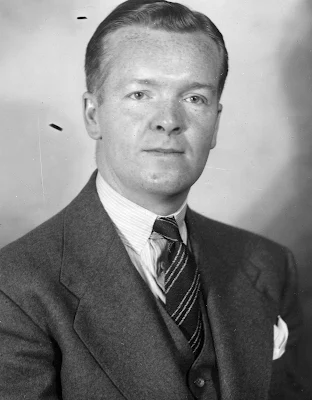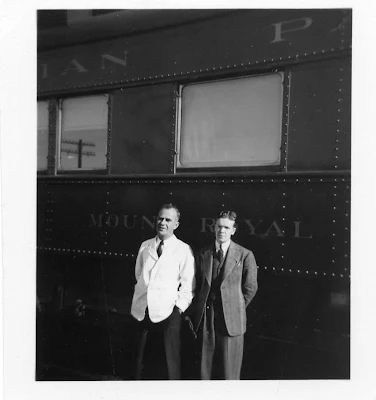Showing posts with label E.R.M.. Show all posts
Showing posts with label E.R.M.. Show all posts
Tuesday, November 16, 2010
Wednesday, March 24, 2010
The Great Reconfiguration
 |
| Taken while driving over the old Champlain Bridge |
I was a six year old child with two parents and a brother. We lived a middle-class life in a middle-class neighbourhood. Life was not perfect because of my father’s bad health, but it was, by 1950s standards, a “normal” life. Then, my father died on November 16, 1956, and my life as I knew it was over. All of the family dynamics changed. I was now a child whose father had died, a child in a one-parent home. I cannot impress on you too much the radical changes in my life that occurred because my father’s death. The whole family was affected by his death. It has affected my entire life and it has been the Great Reconfiguration of my life. It probably made me into the poet I am today, someone who is obsessive, filled with grief, regret, and failure, preoccupied with death, and always concerned with the spiritual side of life.
Silence fell on our house after my father died. His death was met with silence; he became a topic I always felt uncomfortable about and unable to discuss. I was ashamed that he had died. I was now different from all of my friends. I was never consoled in my child`s grief but met with silence; I was expected to deal with my grief by myself. This was not a home where we shared fond and loving memories of my father, it was a home in which the man who is my father was not mentioned. There were no trips to the cemetery to visit his grave, there was just silence, and it was decades before I visited where he is buried.
I will always remember lying in bed as a six year old child, praying to God that my father come home. I will always remember the little toy train engine, powered by batteries, my mother brought home for me from Boston when my father was in hospital there. Someone, perhaps a cousin, stepped on it almost as soon as I received it and broke the wheels; and then the engine, because it had a light on it, became a light I took to bed with me. It was, as I remember, when the toy train was given to me that my mother told me, only a day or a few days after my father had died, “It is better this way, it is better that he not suffer.” And that was the end of that.
No wonder, at university only thirteen years later, when I read William Blake’s “Songs of Innocence and of Experience,” and Isak Dinesen’s wonderful short story “Sorrow Acre,” I found the single myth that was to preoccupy and define my life for many years. It was the biblical story of the Garden Myth, the fall from innocence into experience. It was a myth, a psychological truth, that described my own great reconfiguration. It was the event that saw the beginning of the end of my childhood puer existence and the birth of my senex concerns; it was the event in which I was conceived as a poet and the person I am today, many years older. It was the birth of my soul as a poet.
The Great Reconfiguration affects every aspect of one’s life and unless you have undergone such a radical re-organization of your life, it is difficult to understand how life changing a single experience can be. This new organization of life variables created for me a life I probably would not have had if my father had not died. Almost every aspect—I believe every aspect—of my existence was changed into something other than what it had been only seconds before his death. My life was made harder, I was given a challenge that most children do not receive at age six years. It was the challenge to understand the impermanence of life. To do this, I turned to writing poetry. Poetry was my calling in life, a calling that was presented to me by necessity, by the grief and experience of my father`s death. What my life would been like otherwise is impossible to say, that life that was denied is gone, never to have been. It is only with the perspective of age that I see these events as clearly as I now do; this life journey I am on became something different from what it could have been, it has made this journey difficult but certainly interesting.
Saturday, December 5, 2009
St Anthony of Padua Church
Wednesday, November 18, 2009
Monday, October 5, 2009
Thursday, August 20, 2009
Restaurant Emile Bertrand
 |
| My photo of Restaurant Bertrand |
I visited Restaurant Emile Bertrand once with my father when I was a child (around 1955). It wasn't until around 1994 that I returned there, more by chance than anything else. That first visit, over fifty years ago, he and I may have come down from Windsor Station, where he worked. Why else would we have been in the neighbourhood? But why would I have been at Windsor Station? I remember that visit, the stainless steel counter tops, and that Emile Bertrand's specialty was spruce beer (a soda pop, or "soft drink" as we say in Canada) that has limited appeal and has a sprucey sweet taste, like the smell of spruce tree resin. It's an acquired taste but when I start drinking the stuff I can't get enough! They used to make this drink on the premises, as well as serving the obligatory French fries and hot dogs "fully dressed" (meaning garnished with chopped cabbage and onion)... I like a toasted bun and grilled or steamed hot dog. Premier Bourassa got himself into trouble years ago by referring to certain lower class people as "eaters of hot dogs", but I have a craving for hot dogs every now or then. I rediscovered Restaurant Emile Bertrand fifteen years ago and enjoyed going there again a few times, for sentimental reasons, and I wrote a poem referring to that day I went there with my father. The restaurant was eventually closed, due to a family dispute it seems, about two years ago, and although it was announced they would reopen, they never did (as far as I know). The new ,almost upscale, restaurant now located on the premises is for a new demographic, a younger educated clientele, who want whole grain bread, etc., not fully dressed hot dogs and French fries. Restaurant Emile Bertrand was located on rue Notre Dame West just down from Guy Street, or Peel Street.
Wednesday, June 3, 2009
Friday, May 29, 2009
The Royal Tour, May 1939, Montreal






World War Two had been declared, the Royal Family visited Canada and were in Montreal in May 1939, that's 70 years ago.... These photos were probably taken by my father.
Note: Just recently I realized that bill bissett's poem, "The Canadian", refers to what is probably the same Royal Tour as shown in these photographs, the difference is that he was watching the Royals from his home in Halifax and these pictures were taken in Montreal. I read "The Canadian" when I was a student at university and it is still one of my favourite poems by bissett, it's a terrific evocation of the class system in Canada.
SM; 26 July 2009
Note: Just recently I realized that bill bissett's poem, "The Canadian", refers to what is probably the same Royal Tour as shown in these photographs, the difference is that he was watching the Royals from his home in Halifax and these pictures were taken in Montreal. I read "The Canadian" when I was a student at university and it is still one of my favourite poems by bissett, it's a terrific evocation of the class system in Canada.
SM; 26 July 2009
Tuesday, May 19, 2009
From ERM's office at Windsor Station, Montreal
 Here is my mother's note, written on October 3, 1979, regarding the following photograph (first, below). I remember that day, she gave me the photograph and I kept the note with it and dated it at the time.
Here is my mother's note, written on October 3, 1979, regarding the following photograph (first, below). I remember that day, she gave me the photograph and I kept the note with it and dated it at the time. Taken in the late 1930s (or early 1940s), this photograph (taken from my father's office window at Windsor Station, then the C.P.R.'s head office in Montreal), you can see St. James' Cathdedral (renamed Mary Queen of the World Cathedral around 1950, for the year of Mary) beside Dominion Square in downtown M0ntreal.
Taken in the late 1930s (or early 1940s), this photograph (taken from my father's office window at Windsor Station, then the C.P.R.'s head office in Montreal), you can see St. James' Cathdedral (renamed Mary Queen of the World Cathedral around 1950, for the year of Mary) beside Dominion Square in downtown M0ntreal.
This is the parking lot behind Windsor Station, on St. Antoine Street (where the Bell Centre is now located).
Tuesday, May 12, 2009
Peter Bent Brigham Hospital, October - November 1956
Sunday, May 10, 2009
ERM, portrait and music
Saturday, May 9, 2009
ERM at the beach
Friday, May 8, 2009
Thursday, May 7, 2009
Wednesday, May 6, 2009
Sunday, May 3, 2009
ERM in Miami, 1920s
Subscribe to:
Comments (Atom)








































